- We have a song to sing
- New Tallaght Strategy
- New Cancer Institute for Dublin
- Agreement on Holles Street move to St. Vincent’s
- Additional €17m for health and wellbeing
- Bon Secours wins the ‘Oscars’
- UCC College of Medicine & Health
- Alzheimer Society of Ireland Chief
- Improving discharge planning
- HSE HR Department Scoops Overall Award
- Dementia-Specific Garden at Connolly Hospital
- HSE consults on future of general practice
- Improving safety
- Additional €3m for drugs and social inclusion
- Implement national maternity strategy
- Women unaware of cancer risk
- New unit opened at Cappagh Hospital
- Significant reductions in waiting lists
- Calling women to Breastcheck
- Ireland’s first navy hospital ship
- HIQA names disability centres
- Quality improvement initiatives
- Take suspected hip fractures to trauma hospitals
- Review of medicinal cannabis policy
- Healthcare workers should get ‘flu jab
- Irish drug use and gambling
- Quadruplets, triplets and twins
- Three die from alcohol misuse daily
We have a song to sing

Health service choirs have come together to make what they hope will be a hit Christmas record for Christmas.
“As part of our Engagement Strategy, it was decided to invite all the health service choirs to make a record for Christmas 2016, as we have a good song to sing and an enormous amount of talent,” said HSE National Director of Human Resources, Rosarii Mannion.
“Our aim was to involve as many health service employee choirs as possible and make a hit record for charity.
Monies from the sale of the record will go towards Pieta House.
This project is supported by the INMO. The triumvirate of Rosarii Mannion, National HR Director, Dave Hughes, INMO and Leonie Weekes, Beaumont Hospital have championed this initiative.

The Musical Director is Blanaid Murphy of DCU and the Palestrina Choir. Two songs were chosen – “Carol of the Bells” and “He ain’t heavy, he’s my brother”.
A closed Facebook page was set up, which choir members can access as Health Voices Choir.
Choir practices were held in October and the recording took place on Sunday, November 6, at Tallaght Hospital, Dublin.
It is hoped that the recording will be Number 1 for Christmas and health service staff are asked to download the songs from iTunes or buy a CD.
All twitter updates in relation to the choir are on twitter @HSE_HR
New Tallaght Strategy

Tallaght Hospital has published its first three year Clinical Services Strategy, outlining service development priorities aimed at achieving improving health outcomes for the patients the hospital serves for the next three years. The Strategy focuses on how the Hospital can best contribute as part of the Dublin Midlands Hospital Group and the Children’s Hospital Group.
The Strategy, entitled Caring for the Future, is based on an analysis of the services provided by the hospital and how its model of care should best evolve against a backdrop increased demand and of changing demographic patterns.
The Strategy identifies five key pillars that underpin Tallaght Hospital’s existing specialties and its academic links to Trinity College Dublin. The five pillars include:
- Acute Care Services
- Trauma Services
- Specialist Surgical Services
- Specialist Medical Services
- Paediatric Urgent Care Services
Commenting on the release of the Strategy Michael Scanlan, Chairman, Tallaght Hospital said: “It’s important to recognise that while the Clinical Services Strategy is a plan for Tallaght Hospital, it is not a Tallaght-centric plan. It carves out a distinct role for the hospital across a range of clinical services, while also positioning the facility in its rightful context as a major healthcare provider with local, regional and national functions.”
David Slevin, CEO, Tallaght Hospital said: “Tallaght Hospital is a key provider of services within the Dublin Midlands Hospital Group, the Children’s Hospital Group and within the local catchment area so our focus must result in improved levels of access to patients, while also strengthening our core competencies. It’s a key step in the initial three year process nevertheless healthcare policy is ever evolving and we must remain cognisant of that fact.”
Caring for the Future – A Clinical Services Strategy 2016–2018 can be viewed here: http://www.tallaghthospital.ie/About-us/Caring-for-the-Future-Clinical-Services-Strategy-2016-2018.pdf
New Cancer Institute for Dublin

St. James’s Hospital and Trinity College Dublin are to develop a new cancer institute, which they say will be the first of its kind in Ireland.
A spokesperson for Trinity said the institute would set a new standard for cancer care nationally, integrating medicine and science in cancer prevention, treatment and survivorship.
Based on similar leading international models, it will be located in one designated facility at St. James’s Hospital.
Cancer in Ireland is projected to double by 2040 with increases in all types of cancer.
Lorcan Birthistle, St. James’s Hospital CEO said: “This cancer centre will place research, education and treatment side by side which is in line with the model for the very best cancer centres internationally. The best outcomes for patients are achieved in centres that combine high volume and highly specialised evidence based cancer care with scientific and technological advances. This exciting joint development between Trinity College and St. James’s will achieve this goal.”
Dr. Patrick Prendergast, Provost of Trinity College Dublin, said the cancer institute “will consolidate our strengths in clinical and scientific research for the ultimate benefit of patient care. It will deliver substantially improved outcomes for cancer patients by providing research-led diagnosis and treatment, and promoting a better understanding of cancer through interdisciplinary research.
“We will be educating the next generation of cancer clinicians, health professionals and scientists. Both Trinity and St. James’s Hospital share a long history together training medical doctors, nurses and health professionals who have treated the people of Dublin and Ireland with expertise and dedication. With this new institute we intend to lead the way in innovative new cancer treatment.”
Trinity and St. James’s Hospital have been scaling up for the new cancer institute with the recruitment of key new clinical academic and research appointments in oncology. Accreditation for the new institute is also being sought from the Organisation of European Cancer Institutes that sets the gold standard for leading cancer institutes in Europe. It will benchmark performance against international standards and direct the cancer services and research to the next level.
The National Cancer Registry estimates that the incidence of cancer in Ireland will increase by 50% in 2025 (compared with 2010) and by 100% in 2040 based on population changes. While there have been improvements in cancer care in Ireland over recent years, most indicators show survivorship rates for many cancer types remain lower than in comparable developed countries.
Agreement on Holles Street move to St. Vincent’s
Agreement has been reached between the National Maternity Hospital (NMH) and St. Vincent’s Hospital Group on the redevelopment of the NMH on the Elm Park campus.
This follows extensive mediation discussions over recent months. Both hospitals have now agreed a new governance arrangement for the co-located hospitals which will see the establishment of a new Company – The National Maternity Hospital at Elm Park DAC (limited by shares).
The Design Team will now review and update all the underlying planning documentation with a view to submitting a Strategic Infrastructure Development application to an Bord Pleanala, early in the New Year.
The agreement provides for the following:
- A new company will be established – “The National Maternity Hospital at Elm Park DAC (limited by shares)” – which will be a subsidiary of St. Vincent’s Healthcare Group.
- The new company will have clinical and operational independence in the provision of maternity, gynaecology and neonatal services, as well as financial and budgetary independence.
- The agreement secured will harness the strengths of both hospitals for the betterment of women’s healthcare.
- The agreement protects the identity and branding of the NMH at Elm Park and the right to the use of the new maternity hospital facility.
- The board of the new company will comprise nine directors – four nominated by SVHG, 4 by NMH, including the Master, and one who will be an international expert in obstetrics and gynaecology. The Chair will rotate every three years; the first Chair will be one of the NMH nominated Directors.
- Two of the NMH Directors will also sit on the SVHG Board.
- The autonomy of the NMH Board will be underpinned by reserved powers to ensure clinical and operational independence.
- Those reserved powers can only be amended with the unanimous written approval of the Directors and with the approval of the Minister for Health.
- While recognising the reserved powers for the new maternity hospital, the SVHG will retain overall responsibility for the effective and efficient operation of the totality of the hospital campus.
- The Mastership model for the maternity hospital will be retained. Additionally, the Master will act in the position of Clinical Director of Obstetrics and Gynaecology across the campus.
Additional €17m for health and wellbeing

Almost €17 million additional funding was provided in the budget for Health and Wellbeing in Budget 2017.
This included:
- Establishment of Healthy Ireland Fund – €5m
- Expansion of Breast Cancer Screening – €2.5m
- Expansion of Childhood Vaccine Programme – €7.8m
- Advance Purchase Agreement for Pandemic Vaccines – €1.5m
Minister Marcella Corcoran Kennedy said the Healthy Ireland Fund would allow Government to support innovative, cross sectoral, evidence-based projects, programmes and initiatives that supported the implementation of the key national policies in areas such as obesity, smoking, alcohol, physical activity and sexual health.
The Department of Health will announce details of how the Fund will operate before the end of the year.
The Minster said she was particularly pleased that she was able to continue the planned extension of BreastCheck to all women aged 50-69 on an incremental basis from 2015-2021.
There was also additional funding for vaccination to allow for the introduction of Rotavirus and Meningitis B vaccine for newborns.
Bon Secours wins the ‘Oscars’

Bon Secours Hospital Cork has won the ‘Excellence In Community -Partnership with Charity’ Chambers Ireland Award 2016 – described by many as the ‘Oscars’ in the field of Corporate Social Responsibility.
The award was for supporting the development of a Social Skills app, with the SHINE Centre for Autism, Carrigaline, Co. Cork.
The Social Skills for Autism app – known as ‘Mission Rescue Kloog’ is designed to teach children, adolescents, teenagers and young people with autism the social skills they need to operate effectively and comfortably in social situations.
The app is based on a classroom based programme called PALS, developed and run by The Shine Centre for Autism in Cork. This classroom based programme could cater for only 18 children per annum and had significant waiting lists annually.
A decision was made to move the classroom based content to an on-line format via an ‘app’, so that it could be more accessible. This is where BSHC became involved.
To date the app, with very limited marketing support, has been downloaded in excess of 30,000 times.
BSHC has committed to funding Phase 2 that is scheduled to be released in October of 2016, a follow up on App 1.
Harry Canning, Hospital Manager with BSHC said “We are delighted to be able to support such an innovative project through our Community Initiative Fund. It has reached in excess of 30,000 children after just 18 months and is a fantastic success.”
To win the Chambers Ireland Award 2016 for Bon Secours Hospital Cork is a great honour. The Hospital beat off stiff competition from Bank of Ireland and Datapac in the same category.
Bon Secours Health System commits between €400,000 – €500,000 to charitable causes nationally annually.
Some Examples of recent projects supported are:
- Child Vision Project: Funding of Library Project (Dublin)
- Fitzgerald Park Inclusive Playground Project (Cork)]
- Kerry Link Bus (Tralee)
- Vincent De Paul Homeless Men’s Hostel Shower Block extension. (Cork)
- Social Skill App (Cork)
- Men’s Shed (Tralee)
- Galway Hospice Foundation. (Galway)
- St Francis Hospice Raheny
- St Vincent De Paul (Galway) (Dublin)
UCC College of Medicine & Health
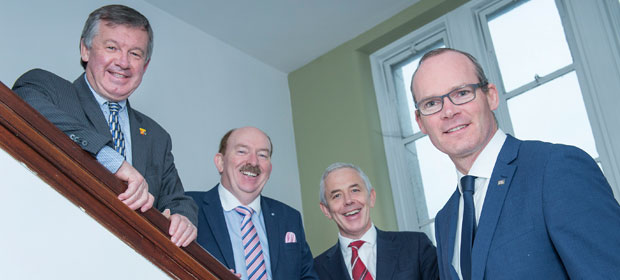
The Minister opened the new home for the University College Cork’s College of Medicine and Health’s Offices in Erinville, where generations of babies entered this world- where so many lives, and so many stories began.
Alzheimer Society of Ireland Chief
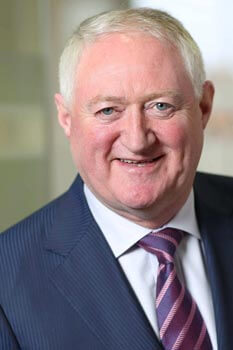
Pat McLoughlin has been appointed Chief Executive of The Alzheimer Society of Ireland. He took up his post in October.
He brings a wealth of leadership experience to The ASI, much of which was gained in the health sector, where he served as CEO of the South Eastern Health Board and later as Deputy CEO of the HSE.
Mr McLoughlin then took up the role of CEO of the Irish Payment Services Organisation, as national payments systems prepared for migration to European formats.
In recent years, he has undertaken a number of consulting assignments in the public and private sectors.
John Clifford, Chairman of The Alzheimer Society of Ireland said: “We are very pleased to welcome Mr McLaughlin to the team at what is a critical time for those living with dementia. There are currently more than 55,000 people with dementia in Ireland, and this figure is expected to treble over the next 30 years. Pat’s extensive and varied experience equips him well to lead ASI through this challenging period.”
Improving discharge planning
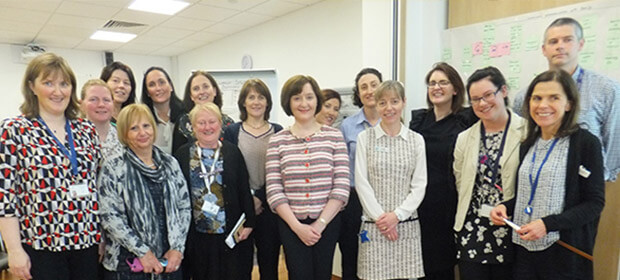
Two Rapid Improvement Events were held in St. Luke’s General Hospital, Carlow/Kilkenny, in October to assist in the improvement of the discharge planning process.
The events focused on the discharge of patients home by 11am, to prepare for the establishment of a pilot discharge lounge and carrying out a value stream analysis of patients with a length of stay of over 14 days and the complexity around their discharges.
The Ireland East Hospital Group has established an Unscheduled Care Programme to assist its hospitals with their unscheduled care processes. The CEO of the Ireland East, Prof. Mary Day, is a strong advocate for the use of Lean methodologies to deliver service improvement. Therefore Lean processes, such as the use of Rapid Improvement Events (RIEs) and A3 thinking are being utilised to deliver service improvements in unscheduled care. They can be deployed in any element of unscheduled care – be it emergency care, bed flow, assessment and decision or prevention and re-enablement.
The Rapid Improvement Events, which are facilitated by experienced service improvement personnel, condense the analysis, solution and actions phases, which can often be lengthy in projects using traditional project methodologies, by having all the relevant stakeholders around the table. RIEs typically run onsite for up to one week. They are then subject to 30, 60 and 90 day reviews.
The benefits highlighted by the teams in St. Luke’s focused on the improvement in patients knowing their predicted date of discharge, improved teamwork and team awareness, staff morale and sense of value, clearer roles and responsibilities and improved patient flow. The teams also stressed the need for the predicted date of discharge to be continuously checked on a daily basis and ongoing communication.
The development of a pilot Discharge Lounge is at an advanced stage and will be open by the end of November.
The Executive Management Team at St. Luke’s General Hospital has welcomed these initiatives and the buy-in from the multidisciplinary teams that are actively progressing the quality improvements, which will have a positive impact on patients and patient-flow in the hospital.
HSE HR Department Scoops Overall Award
The HSE HR Department scooped the overall award at the International Coaching Federation, Ireland Chapter Coaching Awards in Clontarf Castle, Dublin last Saturday evening.
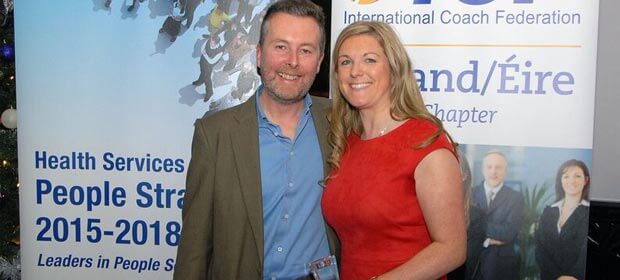
The Department received the Presidents’ Award for their transformative work engaging with over 100,000 people working in the Irish Health Services.
Rosarii Mannion, National HR Director HSE, said she was “just thrilled to accept the ICF Irish Chapter Presidents Award”. She described coaching as “a key enabler and support to the implementation of the Health Service People Strategy.
“Coaching is used to help develop a more engaged workplace and will assist greatly with the roll out of our Performance Achievement process,” she said.
The HR Division of the HSE has designed and implemented a Coaching Support Programme for staff over the last five years across the organisation, and has been actively promoting and communicating the benefits of coaching. Ms. Mannion said their coaching initiative is “helping thousands of our front line workers to have quality conversations in very difficult circumstances, thus enhancing the connection to patient care.”
ICF President, Eoin McCabe said, “This HSE coaching initiative has been deservedly recognised as supporting thousands of HSE staff on the front line in their vital work for our country. It is clear that it is being driven with passion and focus, by dedicated individuals, and will undoubtedly have a positive impact on the lives of millions of patients into the future”.
Dementia-Specific Garden at Connolly Hospital
The Minister for Mental Health and Older People, Helen McEntee T.D., has opened the Dementia-Specific Garden in the Sycamore Unit of Connolly Hospital, Dublin.
The Department of Old Age Psychiatry, Sycamore Unit, Connolly Hospital is a specialist longstay unit for older people with dementia associated with severe behavioural and/or psychiatric symptoms, whose care cannot be provided at that time in an ordinary residential care setting. It is, therefore, both an older person’s facility and one that provides specialised mental health care.
A spokesperson said: “Sycamore Unit provides an enhanced quality of life for the patients in terms of its bespoke and safe environment. Even for those who can no longer walk, it means that they have a lovely view to look out on. Not only do the patients enjoy it, but their families also enjoy being able to take their relatives to the garden.”
Speaking at the opening, Minister McEntee said, “Each person’s experience of dementia is unique. It depends on the type of dementia, other health conditions and the circle of care and supports which are available for the individual. If supported, many people can live well with dementia, and almost 63% of those living with the condition live in the community. However, this is not always possible and many people living with dementia find that their individual needs are best met in dedicated units such as the Sycamore Unit.
“The dementia-specific garden here in Connolly Hospital has been designed with the needs of the person with dementia to the forefront. It will provide an enhanced quality of life for patients in terms of its bespoke and safe environment. The garden has been designed in a way that also facilitates people who are no longer mobile to still enjoy the lovely views. The garden will be of benefit not just to the residents of the Unit but also their families and friends who come to visit and share a “quiet moment” away from the hustle and bustle of the hospital ward.”
HSE consults on future of general practice
Health managers may wish to participate in a consultation and engagement process which is being undertaken by the HSE.
The HSE says it is aimed at deepening its understanding of priorities that will help support an improved Primary Care and GP service. “We want to establish what matters most to those who use and those who provide GP and primary care services.
“The process underway involves broad-ranging service-user consultation and engagement including one-to-one qualitative interviews, an omnibus survey, a variety of focus groups with stakeholders and a public consultation survey. This input from patients, GPs and key stakeholders will be a rich source of information for the upcoming GP Contract negotiations.
“The vast majority of people living in Ireland use GP services each year for themselves and their families. Latest HSE figures (2015 PCRS annual report) show that almost 2.2 million people or 47% of the population is covered by a medical card or a GP visit card, and 3.7 million people were registered for community scheme services provided by General Practitioners, Pharmacists, Dentists and Optometrists or Ophthalmologists.
“The survey and wider engagement process will inform us as we improve and build a better primary care and GP service for the people who need and use our services throughout the country.”
The GMS negotiation process with representative bodies will commence in December 2016.
The survey is being conducted on behalf of the health sector by Coyne Research, an independent market research/polling company. Those who wish to participate in the survey can complete an online survey (www.hse.ie/mygpsurvey).
Improving safety
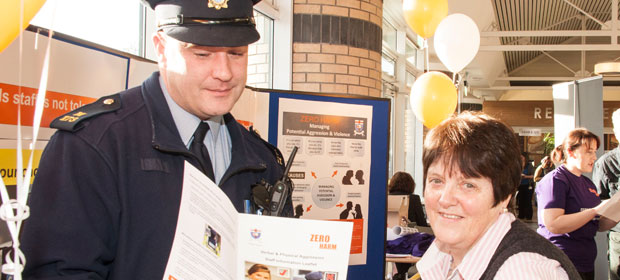
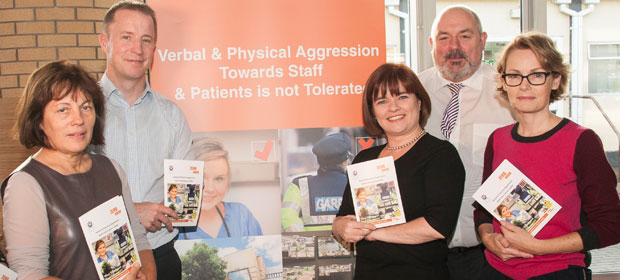
Additional €3m for drugs and social inclusion.
An additional €3m has been provided in Budget 2017 to support drugs and social inclusion measures.

Catherine Byrne, Minister of State for Communities and the National Drugs Strategy, said the extra funding would enable the HSE to continue providing interventions aimed at improving the health outcomes of the most vulnerable in our society, including Traveller and Roma communities, those affected by addiction issues, those experiencing homelessness and asylum seekers and refugees.
She said the additional funding would also be used to support the establishment of a pilot supervised injecting facility in Dublin city centre during 2017. Legislation is being drafted by the Department of Health to allow for the establishment and licensing of supervised injecting facilities. Drafting is at advanced stage and it is intended to publish the Bill during the current Dáil session.
Minister Byrne said “The establishment of a supervised injecting facility is high on my agenda. This facility is badly needed to address the problem with street injecting in Ireland, which particularly affects Dublin city centre.”
“The difficulties experienced by under 18s in getting access to drug and alcohol treatment and the limited options available for detoxing from drugs were among a number of issues raised with me during the public consultation on the National Drugs Strategy”, the Minister continued. “It is my intention to use the additional funding to address gaps in service provision for under 18s and in providing more detox places in community and residential settings next year”.
“I expect to receive a report from the Steering Committee set up to advise me on the new drugs strategy early in the New Year. Minister Harris and I intend to develop and bring to Government a proposal for multi-annual investment in drugs as part of the memorandum for Government on the new strategy,” the Minister concluded.
Implement national maternity strategy
HIQA CEO, Phelim Quinn called for a strong commitment to the full implementation of the national maternity strategy, when he addressed the All Ireland Midwifery Conference
He said this strategy embodied critical concepts such as the three levels of care within the services, a health & wellbeing approach, access to safe, high-quality, nationally consistent, woman-centred maternity care, adequate resourcing and strong and effective leadership, management and governance.
Mr. Quinn said that some significant steps in the journey to improvement of our maternity services had been taken, but much more needed to be done.
He believed we needed to see:
- Implementation of the National Maternity Strategy,
- Approval, dissemination and implementation of the National Maternity Standards for Safer Better Maternity services that have been developed in alignment with the strategy.
- A mechanism such as robust commissioning model that not only drives improvement in service and financial performance, but helps in the delivery of the national strategy and quality and safety.
- We need to see a commitment by service providers and clinical staff to ensure swift, robust and transparent investigation of patient safety incidents.
- We need to ensure that patients with concerns or worries have the support of an independent patient advocacy service.
- We need to ensure that women are at the centre of what we deliver in our maternity services.
“This will require commitment at all levels, whether that be at political, national, hospital and at practice level. We need to ensure that the journey to safer better maternity care progresses in line with 21st century standards and to ensure in line with today’s conference title that those services are for and “all about the women.”
Mr. Quinn said that HIQA had submitted to the Minister the new National Standards for Safer Better Maternity Standards. “These standards developed over the last year are informed by national and international research and best practice; are aimed at improving the safety and quality and consistency of maternity services; written in a way that women can understand what safe, high-quality maternity care looks like and promotes practice that is up to date, effective and consistent with international best practice. We look forward to Ministerial approval and launch of the standards into our national services.”
He welcomed a number of recent initiatives but said there was still more to do.
“It is obvious that the length of time taken to investigate Patient Safety Incidents is unacceptable; in some instances the process for their conduct remains ineffective and non-transparent. In October, HIQA published draft national standards on the management of patient safety incidents for consultation. Their ratification and implementation is critical if services are to regain the confidence of women using our maternity services
“In our investigations into critical incidents and service failure in Galway and Portlaoise we also sought the development of a Code of Conduct for employers and managers, Supporting legislation for the establishment of hospital groups and the establishment of an Independent Patient Advocacy Service. Three years on these key recommendations remain ‘in development.’
“As part of the wider strategic review, Government should consider the introduction of a robust national commissioning model. In the context of maternity services I believe that such a model can have a positive impact on effective service provision, governance, financial efficiency and in improving the quality and safety of services.
“Commissioning arrangements explicitly define and separate the roles of purchaser and provider of services; currently both of these functions are usually performed by the HSE. An effective commissioning body is responsible for purchasing health and social care services from providers. Procurement is always based on an agreed strategy, assessed need, best available evidence of service efficacy, value for money, and the capacity and capability to deliver a safe and effective service. While cost is, of course, important, quality and the delivery of safe services should be the primary goals.
“Commissioning frameworks can provide for national, regional and local procurement arrangements that are person-centred and address local needs. This facilitates a focus on the health and wellbeing of local people and on achieving the best possible outcomes within available resources. While procurement decisions are made locally, the service itself is delivered in the most effective, efficient manner, whether in the community or at a national level.
“A national commissioning model would contribute to effective medium- to long-term planning by gathering evidence of current and future service needs. It would also optimise service configuration based on sound strategic planning. The introduction of a standardised framework to commission services would help, by way of example with the implementation of national clinical care programmes and strategies such as the National Maternity Strategy.
“It is undoubted and right that Ireland’s maternity services have come under significant scrutiny in recent years. The list of significant service failures and tragedies involving young women and in some instances their infants has required us all within the system to stand back and reflect on what needs to be done – but more importantly to get on with it.”
Women unaware of cancer risk
While 90% of respondents know that alcohol is a risk factor for liver disease, only 27% of women are aware of the increased risk of developing breast cancer as a result of heavy drinking, according to the second annual Healthy Ireland Survey.
It also showed that the majority (55%) of men who drink consume six or more standard drinks (“binge drink”) on a typical drinking occasion while fewer than 1 in 5 (18%) women drink to this level.
Fewer than 1 in 10 women takes a folic acid supplement with just 18% of women aged 25 to 34 doing so.
Commissioned by the Department of Health, the survey of 7,500 people aged 15 and over living in Ireland gives an up-to-date picture of the health of the nation and reports on many lifestyle behaviours such as smoking, alcohol consumption, physical activity, diet and mental health. A number of new topics were included in this year’s survey, which examined additional aspects of health behaviours and issues such as multiple risk factors and knowledge and attitudes about health behaviours.
Some new findings in this year’s survey results include:
- Eighteen per cent of the population in Ireland is exposed to second-hand smoke on a daily basis
- While only 54% of people living in Ireland said they would be willing to live with somebody with a mental health problem, 83% of people said they would be willing to carry on a relationship with a friend who developed a mental health problem
- People spend 6 hours and 36 minutes sitting on an average day and while men generally spend longer sitting than women, younger women spend more time sitting than men of the same age
- Most people (63%) would like to be more physically active although many say that time pressure due to work or caring is a barrier
Dr. Tony Holohan, Chief Medical Officer at the Department of Health said: “While we have made progress in some areas in the last few years, rates of tobacco consumption, alcohol usage, food consumption patterns and physical inactivity are leading causes of increases in chronic conditions. This survey is clearly showing us a clustering of risk factors for poor health with significant numbers of people having two or more unhealthy behaviours. The data from this survey are a very valuable asset to assist the Department of Health and our other partners working for a Healthy Ireland. “
The Survey showed that of the four types of unhealthy behaviours under consideration, the most common was that almost three-quarters (73%) of the population eat fewer than five portions of fruit and vegetables daily. Between a fifth and a third of the population have each of the other three behaviours – binge drinking (28%), sedentary behaviour (26%) and smoking (23%).
Some of the other important findings include:
- 84% of people living in Ireland say their health is very good or good although 28% indicate that they have a long-standing illness or health condition.
- 23% of the population are current smokers.
- Three in five eat snacks every day with 42% of the population eating six or more portions daily.
- Just 27% eat five portions of fruit and vegetables daily.
- 14% consume sugar sweetened drinks daily, rising to 22% of those aged 15 to 24.
- 37% of drinkers indicate that they drink six or more standard drinks (“binge drinking”) on a typical drinking occasion.
- 91% of those who feel they do not undertake a sufficient level of activity would like to be more active.
- While 19% of people living in Ireland smoke on a daily basis, recruitment of new smokers continues at a high rate with 20% of those aged under 25 currently smoking.
- 67% of men and 39% of women aged under 25 binge drink on a typical drinking occasion.
- The average annual number of GP visits rises from 3.4 visits among 15 to 24 year olds to 8.4 among those aged 75 and older and 27% have consulted a medical or surgical consultant in the past 12 months.
- Approximately half of the people living in Ireland have had some experience of people with mental health issues.
New unit opened at Cappagh Hospital
A new €1.9million, 12 bed Post Anaesthetic Care Unit (PACU) at Cappagh National Orthopaedic Hospital, Dublin, has been officially opened by Health Minister, Simon Harris.
Cappagh National Orthopaedic Hospital has six fully functional operating theatres but the previous Recovery Room developed in the early 1960s only had five beds. Each theatre requires two recovery beds to enable proficient operational flow and efficiency.
Funded by the HSE, Cappagh Hospital Foundation and the Mater Trust, the development of the new Post Anaesthetic Care Unit is the final stage of the theatre modernisation at Cappagh National Orthopaedic Hospital.
This development was preceded by the development of three new state of the art theatres in 2011, one specifically designed with a large canopy for complex cases, and a new purpose built Central Decontamination Unit in 2014.
The 12 bed PACU results in a facility that meets Association of Anaesthetists of Great Britain & Ireland (AAGBI) guidelines of two recovery bays to one theatre. This improves theatre efficiencies and patient throughput by reducing discharge delays from the operating theatre to recovery, increase dedicated paediatric bays from one to three.
Cappagh is the country’s national tertiary referral centre for both adult and children’s orthopaedics. A total of 27 Consultant Orthopaedic Surgeons deliver a highly specialised and efficient service in this major orthopaedic centre.
It manages a cohort of highly specific bone tumour cases, is a harvest centre and distributor of bone graft nationally and provides advanced rehabilitative services to patients from both the Mater Hospital and Connolly Hospital.
Cappagh carries out elective orthopaedic surgery for six adult and children’s hospitals in the east: the Mater Hospital, Connolly Hospital, Beaumont Hospital, St James Hospital, The Children’s University Hospital Temple Street, St Vincent’s University Hospital.
It is a major teaching institution with undergraduate and postgraduate training facilities in medical, surgical anaesthetic and nursing programmes in conjunction with the Royal College of Surgeons in Ireland, University College Dublin and Dublin City University.
It has 157 beds for adults and children. On average it carries out approximately 3,000 major patient operations, 8,000 minor operations and 12,000 out-patient reviews annually.
A spokesperson said it was now in a unique position to be able to manage elective orthopaedic waiting lists for the greater Dublin region and assist acute hospitals in freeing up necessary theatre and ward space for acute and emergency care.
Significant reductions in waiting lists
There have been significant reductions in waiting times across a variety of key services, including stroke and endoscopy, in Tallaght Hospital, Dublin, according to the hospital’s annual report for 2015
These improvements have been welcomed by Hospital management, as evidence of the continually improving standards at the hospital while acknowledging that further improvements in access times are required.
Since 2014, the Endoscopy waiting list was reduced by 46% for patients waiting both more and fewer than 13 weeks. This reduced waiting list led to improved urgent access to endoscopy.
The report highlighted that the average length of stay for stroke victims fell to a two year low and Tallaght Hospital retained one of the lowest mortality rates for stroke victims in the country.
In other areas, the report said the opening of the expanded floor space in the Emergency Department improved patient experience time to its best level for months and delayed discharges dropped to a three year low of 23 patients.
Patient Experience Time (PET) from Q4 2015 was the best on record for months, 17% better than last year due to full opening of the expanded Emergency Department floor space
A spokesperson said Tallaght Hospital was one of the better performing hospitals in the state on income collection according to the Comptroller & Auditor General Report on the Accounts of the Public Services 2014. Total private patient debt outstanding was less than 100 equivalent debtor days, compared to 186 nationally.
He said the hospital was a model of diversity and inclusivity, employing 3,091 individuals from 33 different nationalities.
David Slevin, CEO, Tallaght Hospital said the 2015 Annual Report highlighted the good work that had been ongoing in Tallaght Hospital over the past year. “Our staff are committed to providing the best outcomes for patients and I welcome the continuing improvement in waiting times. All hospitals are under pressure with a growing population and it is important that we respond to the challenges of an increasingly older patient demographic. Our staff rose to many challenges during the past year and I would like to commend them on all their hard work. I am very confident that the Hospital can build on its success in the year ahead.”
Calling women to Breastcheck
BreastCheck is reminding all eligible women to participate in the programme.
Since it began in February 2000, BreastCheck has provided over 1.4 million mammograms to almost 500,000 women and has detected over 9,300 cancers.
A BreastCheck appointment only takes 30 minutes. It’s quick, it’s easy and it’s free. The vast majority of women screened are found to be perfectly healthy.
The risk of breast cancer increases with age and it is important that all eligible women avail of their regular free mammogram every two years, so that changes can be identified at an early stage. If a breast cancer is found early, it is generally easier to treat and there are more treatment options available.
The programme encourages eligible women to make sure they are on the BreastCheck register by checking online at www.breastcheck.ie or by calling Freephone 1800 45 45 55.
Until recently, the eligible age range for screening was 50 to 64. This age range is currently being extended on a phased basis to the age of 69. By the end of 2021, all women aged 50 to 69 will be invited for routine screening.
Most eligible women have had at least one free BreastCheck mammogram. Once they have had a first mammogram, eight out of every ten women come for their next mammogram, when they receive their appointment. However, the participation rate of younger women is lower than older women. BreastCheck would like to see an increase in the number of all women attending their screening appointment when invited, particularly these younger women. The programme is also asking women who have already participated in BreastCheck to encourage other women of similar ages to attend for screening when they are invited.
Ireland’s first navy hospital ship
A new navy hospital ship, to provide medical facilities at sea, is included in The White Paper on Defence.
The multi-purpose naval service ship equipped with a fully functioning hospital, would allow medical personnel to serve in “war and conflict situations,” according to An Taoiseach, Enda Kenny, speaking at the commissioning of the Naval Service’s latest new patrol ship, LÉ William Butler Yeats.
The new hospital ship, which would respond to humanitarian emergencies worldwide, is still at pre-design stage.
Mr Kenny said it was “his wish” that such a multi-purpose ship, would be built to serve in humanitarian crises. It was in “keeping with our rich tradition of charity and volunteering,” he said.
The new vessel, which is captained by Lieutenant Commander Eric Timon, was built in Appledore shipyard in Devon, as was LÉ Samuel Beckett and LÉ James Joyce, which recently rescued 108 migrants from the Mediterranean. A fourth ship in this class is to be delivered in 2018.
HIQA names disability centres
The names of residential disability centres are now included in HIQA published inspection reports.

Finbarr Colfer, HIQA Head of Disability Programme said: “We hope this measure will make it much easier for residents, family members, staff members and the public to access inspection reports on these centres.”
Initially, to protect the privacy of residents, HIQA did not publish the names of centres. However, the Authority said residents, family members and members of the public said that reports for centres that they were involved with were very difficult to find.
“We were also advised that in order to comply with legal requirements, centres must be named on the register.”
“We have taken measures to ensure the privacy of residents living in these centres, particularly in centres where the address of the centre had been incorporated into the name of the centre.”
“Providers of these services were given the opportunity to rename their centres for the purposes of registration, and a total of 220 centres did so.”
“This involved significant work by HIQA’s registration team in relation to coordinating the changes and issuing revised certificates of registration.”
Quality improvement initiatives

Over 50 quality improvement initiatives were completed at Tallaght in 2015, according to the hospital’s Quality Report for the year.
They included:
- Monthly reviews of service user complaints at Directorate Level to address and monitor issues
- Development of Rapid Access Clinics
- Development of a Transition Lounge
- Development of sensory rooms in the Out Patients and Emergency Departments to provide a space for children with autism to channel their anxieties
- Child/Parent outpatient and in-patient surveys/Patient Forum
- Upgrading of parents’ accommodation and quiet room
- Electronic requesting of microbiology tests and booking of phlebotomy appointments
- Out of House Clinical Decision Making Project
- Violence and Aggression Quality Improvement Plan (QIP)
- Nutrition Steering Group QIPs
- Medical Device Equipment Committee QIPs
- Ward Round QIPs
- Development of a physiotherapy treatment room at ward level
- Pre-admission of surgical patients prior to Day of surgery admission
Michael Scanlan, Chairman, Tallaght Hospital said: “The Board is delighted to support the publication by the Hospital of a separate Quality Report. Quality of care is obviously important to our patients and the initiatives outlined in the report demonstrate the efforts being made by staff to learn and improve. Continuous improvements will help make Tallaght a better hospital for patients and a better place for people to work.”
Take suspected hip fractures to trauma hospitals
All suspected hip fracture patients should be brought directly to a trauma operating hospital, it has been recommended by the Irish Hip Fracture Database National Report, 2015.
The data base, which covers the year 2015, was launched by The National Office of Clinical Audit (NOCA) and captured clinical audit data for 81% of all hip fracture cases nationally.
It showed that 3,591 patients aged 60 years or over were hospitalised in Ireland following a hip fracture in 2015.
It also showed that 72% of medically fit patients received surgery within 48 hours and during normal working hours – this was an increase of 3 percentage points compared with 2014.
Nine per cent of patients went directly from the emergency department to theatre. Patients who did not present directly to the ED in an operating hospital spent an average of two days longer in hospitals than those patients who presented directly. Therefore, it was recommended that all suspected hip fracture patients should be brought directly to a trauma operating hospital.
A spokesperson said that with an ageing population, the IHFD was the catalyst towards addressing what was a significantly growing healthcare and societal challenge. “Using this data at a local level each hospital can improve the quality of care they deliver and nationally this data enables strategic planning for the future development of care for older people in Ireland. This report is the most comprehensive report published so far from the IHFD and includes all 16 trauma receiving hospitals and a national facilities audit also. The mission statement of the IHFD is to optimise the surgical, medical, nursing, rehabilitation and secondary prevention care for all hip fracture patients.
Copies of the report are available to download from www.noca.ie/publications.
Review of medicinal cannabis policy
Minister Harris has announced that he wants to review Ireland’s policy on medicinal cannabis with the best clinical advice and expertise.
As part of this review, the Minister has asked the HPRA (Health Products Regulatory Authority, formerly the Irish Medicines Board), to provide him with their expert scientific advice.
“This is not a discussion about decriminalising cannabis in any way shape or form, it is about reviewing our current policy and seeking to inform ourselves of the latest medical and scientific evidence on the potential medical benefits of cannabis for some people with certain medical conditions”, the Minister said.
“Since coming into office I have had initial discussions with my officials, medical experts, patients and members of the Oireachtas. I am therefore very pleased to understand from the Chair of the Oireachtas Health Committee, Dr. Harty, that the Committee is planning to discuss this issue.”
Cannabis for medical purposes is available in a number of countries, e.g. Netherlands, Czech Republic, Canada, Australia, Malta, Croatia and certain states in the United States. However it remains strictly controlled in Ireland. In the countries where it is available, it is strictly regulated but available on prescription from doctors and supplied in a standardised form through pharmacists.
Minister Harris continued, “I met with Vera Twomey, mother of Ava, in June and I understand the very difficult situation the family are in. I look forward to meeting with Vera again in the coming days.
“I know that many patients believe cannabis should be a treatment option for their medical condition. However, cannabis is not currently an authorised medicine and has not gone through the normal regulatory procedures for medicines which are designed to protect patients and ensure treatments are supported by good evidence of their effectiveness”.
Minister Harris looks forward to hearing back from the HPRA and to the outcome of the deliberations of the Oireachtas Health Committee.
Healthcare workers should get ‘flu jab
Health Minister, Simon Harris has urged all healthcare workers and people in at-risk groups to get vaccinated against influenza.
Minister Harris said, “Vaccination reduces the spread of ‘flu in the general population so you are protecting not just yourself but others who are at risk”.
The Chief Medical Officer Dr. Tony Holohan said, “I would continue to urge health professionals and at-risk groups to get the vaccine. Health professionals have the highest degree of contact with vulnerable patients and a higher risk of transmitting ‘flu to patients. All at risk patients, including the elderly and pregnant women, should also get the ‘flu vaccine as the vaccine is the only real defence against ‘flu.”
The ‘flu vaccine prevents ‘flu which is a serious disease with up to 1,000 ‘flu related deaths during a severe ‘flu season. People in the at-risk group include healthcare workers, over 65s, people with chronic illnesses and pregnant women, and are all advised to get vaccinated.
Irish drug use and gambling
The overall prevalence rate for last year use of any illegal drug was 8.9% in 2014/15 compared with 7% in 2010/11, according to the latest report on drug use in Ireland and Northern Ireland.
It showed that cannabis continued to be the most commonly used illegal drug, with 27.9% of respondents aged 15-64 having ever used the drug, 7.7% having used cannabis in the last year and 4.4% in the last month.
The use of new psychoactive substances (NPS) had dropped significantly, from 3.5% of respondents in 2010/11 having used NPS in the last year to 0.8% of respondents in the 2014/15 survey reporting use in the last year”.
The report has been published by the National Advisory Committee on Drugs and Alcohol (NACDA) and the Public Health Information and Research Branch of the Department of Health in Northern Ireland. It states that it provides a measure of the current illegal drugs situation in Ireland.
The Chair of the NACDA Professor Catherine Comiskey said: “While some legal drugs such as alcohol and tobacco are included, the main focus of the survey was to obtain prevalence rates for illegal drugs, such as cannabis, ecstasy, cocaine and heroin on a lifetime (ever used), last year (recent use) and last month (current use) basis. It is significant that the level of recent and current drug use has risen between 2010/11 and 2014/15 for all illegal drugs.”
Speaking about the results of the survey in Northern Ireland, Dr. Mervyn Wilson of the PHIRB said, “More than a quarter of people surveyed (28%) reported having used an illegal drug during their lifetime, with 6% having done so during the previous year and 3% during the last month. Cannabis was the most commonly reported illegal drug with a quarter of respondents (25%) reporting having ever used the drug, 5% reporting recent use and 3% reporting current use. After cannabis, the most commonly reported drugs ever used were ecstasy (10%), poppers (7%) and cocaine powder (7%).”
The survey found that lifetime, last year and last month prevalence of ecstasy had increased significantly since 2010/11, with 4.4% of 15-34 year olds reporting use of ecstasy in the last year compared to 0.9% in 2010/11. In the 25-34 year old age group, 22.7% of males and 10.4% of females reported ever using ecstasy.
Prevalence of gambling in Ireland was included in the survey for the first time. Results indicated that 64.5% of respondents aged 15 or older reported gambling in the 12 months prior to the survey and 41.4% of respondents reported gambling in the 30 days prior to the survey. Further detailed analysis of this section will be available in a future bulletin.
Almost a quarter of respondents (24%) reported ever taking anti-depressants, while over a fifth reported taking other opiates (22%) and sedatives or tranquillisers (21%). There was a significant increase between 2010/11 to 2014/15 in the proportion of respondents who had taken other opiates across all prevalence periods and anti-depressants in both last year and last month prevalence.”
Quadruplets, triplets and twins

The Neonatal Unit at University Maternity Hospital Limerick is a busy place at any time of year and has been especially so in recent weeks with the arrival in quick succession of quadruplets, triplets and twins.
Photographer PJ Corbett – who specialises in newborn portraiture – is a regular visitor to the unit and was on hand to capture the moment when the unique 4-3-2-1 combination of premature newborns was brought together for a photo. It is the first-time the Limerick unit has had the privilege of caring for a set of quads, triplets, twins and singeltons all at the same time.
Lisa Fenton from Caherconlish, County Limerick, made a little bit of history when on October 5 she gave birth to the first set of quadruplets born in Limerick in 50 years. Other quads from the Mid-West born in the intervening years had been delivered in the major Dublin maternity units. Babies Alexander, Ashley, Maxwell and Kayla are the first children born to Lisa and her partner Wayne Downey and were delivered at UMHL by Professor Amanda Cotter and her team. The quads have been doing very well in Neonatal Unit ever since.
Triplets Dáire, Liam and Aisling Cussen were born on October 27th to parents Olive and William and will soon be strong enough to go home to Raheen, Limerick.
Twins Ashton and Leo Mulcahy were born on October 13th to mum Lydia O’Doherty and dad Calum Mulcahy, from Annacotty.
And representing the 12 tiny singletons currently being looked after in the Neonatal Unit in PJ’s photo is little Maggie Roche from Charleville, County Cork, born to mum Mairead and dad Kieran on October 26th.
Neonatal at UMHL is one of the busiest such specialised units in the country, with close to 700 admissions every year. There are now approximately 4,700 births at UMHL annually.
The Neonatal Unit at UMHL has 19 cots but often caters for more babies. It provides neonatal intensive care, high dependency and special care to premature and sick babies of the Mid-West, from 23 weeks of gestation upwards.
“We have had the pleasure of looking after quadruplets, triplets, twins and singletons in the Neonatal Units at various times over the years but not as far as any of us are aware all at the same time in Limerick. It is a special occasion for all of the team working here and it is a time of great joy for us as well as their parents,” said Consultant Neonatologist, Dr. Roy Philip.
“The dedication and teamwork of the antenatal, perinatal and neonatal clinical teams of our maternity hospital is reflected in the wellbeing of the babies and we are proud of it. It is a happy coincidence also to have them all here together as we get ready to mark World Prematurity Day on November 11th,” Dr. Philip added.
The team involved in caring for these babies includes four consultant neonatologists: Dr. Roy Philip; Dr. Niazy Al Assaf; Dr. Con Sreenan and Dr. Anne Doolan; along with 48 neonatal nurses and midwives under the clinical leadership of Margo Dunworth, Deirdre O’Connell and Marie Carroll; ward attendants; healthcare assistants; physiotherapists; radiographers; laboratory and clerical staff and others.
According to Clinical Nurse Manager, Marie Carroll: “It was amazing to get all 10 babies together for a special photo. We are very grateful to PJ, who left his studio in Adare without hesitation to come in and take the photo. He clearly is a very talented photographer to manage to get such a beautiful image of so many babies at once! PJ also comes in to us every year to take photos of Santa with the babies and the parents in the Neonatal Unit. Christmas has come early for some families this year. All 10 of them are doing well and should hopefully be back at home with their families before December 25th.”
Three die from alcohol misuse daily
Three people a day died in Ireland as a result of alcohol misuse, which was more than the numbers killed on our roads, Minister for Health Promotion, Marcella Corcoran Kennedy said when she opened a conference in the European Parliament on Minimum Unit Pricing of Alcohol.
She said every night at least 1,500 hospital beds were occupied as a result of alcohol misuse.
“Ireland has a serious problem – we drink too much alcohol and when we drink, we tend to binge drink. More than half of adult drinkers in the population are classified as harmful drinkers,” said the Minister.
“Our aim is to reduce alcohol consumption to the OECD average and to reduce binge drinking. The Government is tackling this with the Public Health (Alcohol) Bill which is the first ever public health legislation on alcohol and among the most far-reaching in Europe. It will bring in minimum unit pricing to tackle cheap alcohol, the separation of alcohol in stores to reduce availability and visibility, health and calorie labelling to give people more information about the risks they are taking and also marketing and advertising restrictions.”

